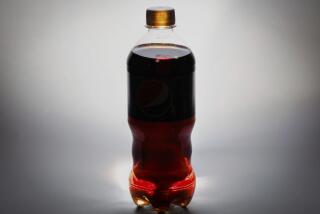Food Preservatives Found to Boost Cancer Fighters
- Share via
NEW YORK — Two widely used food preservatives boosted levels of a natural cancer fighter in laboratory animals and appear to do the same thing in humans, a researcher reported Thursday.
Advocates of natural foods have long decried the use of preservatives, but Dr. Andrew Dannenberg of Cornell Medical College found that the preservatives BHA and BHT “revved up” the gene for an enzyme that helps destroy carcinogens before they trigger tumors.
When the genes are cranked up, they produce more of the enzyme, providing better protection against cancer-causing substances in the environment, Dannenberg reported at the International Conference on Cancer Prevention at Rockefeller University in New York.
BHA and BHT are synthetic additives used as preservatives in cookies, crackers and a wide variety of other foods.
The results do not mean that foods should be pumped up with even more preservatives, Dannenberg said. The findings are important because they uncover a cancer prevention mechanism that appears to be part of the explanation for the well-known anti-cancer properties of broccoli, cauliflower and brussels sprouts.
His research shows that at least part of the effect of those compounds comes from revving up the same gene affected by BHA and BHT.
The gene produces an enzyme with the long name UDP-glucuronosyltransferase, or UGT. The study found elevated levels of the enzyme in the liver, kidneys and small intestines of rats fed higher doses of BHA and BHT than are normally found in foods, Dannenberg said.
He then found preliminary evidence that the substances do the same thing in humans. Dannenberg said he has also found that sulforaphane, an anti-cancer agent recently isolated in broccoli, exerts its action partly in the same way, by revving up the gene for UGT.
The results appear at a time when researchers have become widely convinced of the value of fruits and vegetables in preventing cancer but have made little headway at figuring out exactly why that’s true.
One problem is that many people avoid the foods with the most potent anti-cancer effects, said Dr. Walter Willett of the Harvard School of Public Health.




